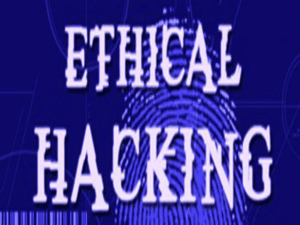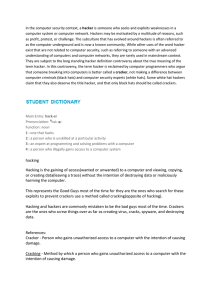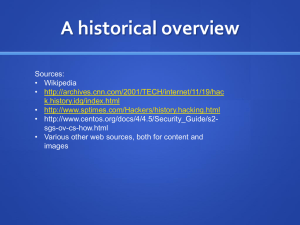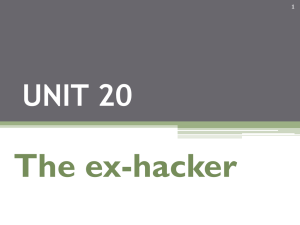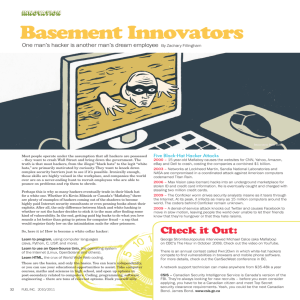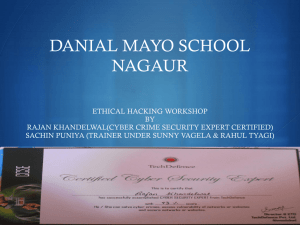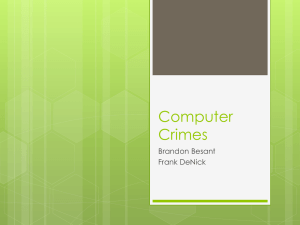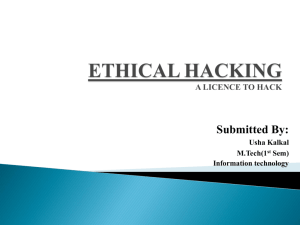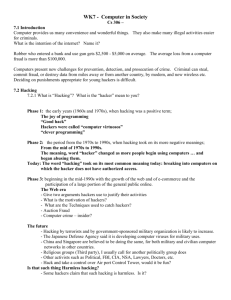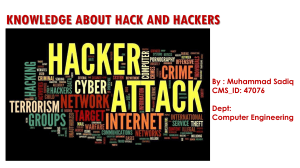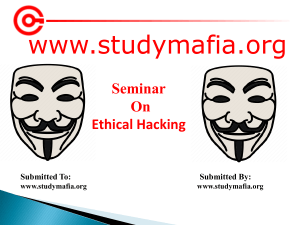Chps 5, 7, & 12 Topics for paper
advertisement
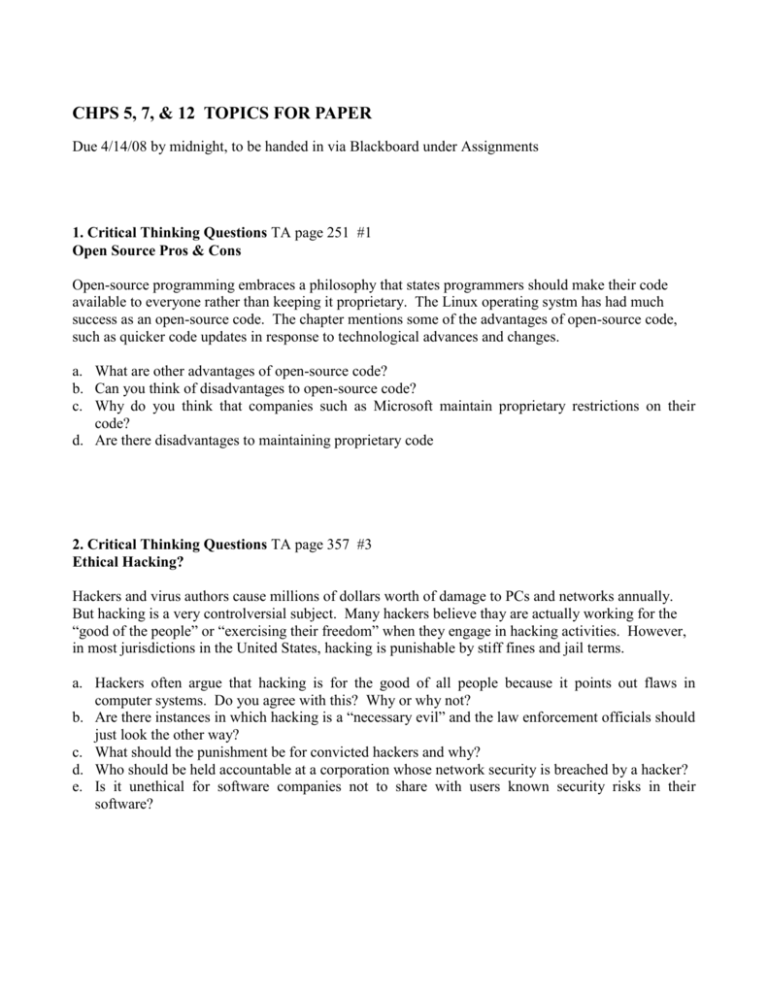
CHPS 5, 7, & 12 TOPICS FOR PAPER Due 4/14/08 by midnight, to be handed in via Blackboard under Assignments 1. Critical Thinking Questions TA page 251 #1 Open Source Pros & Cons Open-source programming embraces a philosophy that states programmers should make their code available to everyone rather than keeping it proprietary. The Linux operating systm has had much success as an open-source code. The chapter mentions some of the advantages of open-source code, such as quicker code updates in response to technological advances and changes. a. What are other advantages of open-source code? b. Can you think of disadvantages to open-source code? c. Why do you think that companies such as Microsoft maintain proprietary restrictions on their code? d. Are there disadvantages to maintaining proprietary code 2. Critical Thinking Questions TA page 357 #3 Ethical Hacking? Hackers and virus authors cause millions of dollars worth of damage to PCs and networks annually. But hacking is a very controlversial subject. Many hackers believe thay are actually working for the “good of the people” or “exercising their freedom” when they engage in hacking activities. However, in most jurisdictions in the United States, hacking is punishable by stiff fines and jail terms. a. Hackers often argue that hacking is for the good of all people because it points out flaws in computer systems. Do you agree with this? Why or why not? b. Are there instances in which hacking is a “necessary evil” and the law enforcement officials should just look the other way? c. What should the punishment be for convicted hackers and why? d. Who should be held accountable at a corporation whose network security is breached by a hacker? e. Is it unethical for software companies not to share with users known security risks in their software? 3. Critical Thinking Questions TA page 357 #5 Protection for Your Computer Do you have a firewall, anti-spyware, and antivirus software installed on the computer you use most often? If not,why not? What types of problems can you experience from not having this software installed? Have you (or someone you know) ever been a victim of a hacker or a virus? If yes, what were the effects of the hacker or virus? How did you fix it? You can add a little research, perhaps about the types of things that can happen to someone’s computer that isn’t protected, some stats about how many are affected by hackers or viruses, and any other pertinent information that you find. Did you realize how many dangers are out there with not having a protected computer? 4. Critical Thinking Questions TA page 619 #1 Internet Risks at School Internet access is deemed essential to enable students to research projects and papers adequately. But granting that access potentially invites people to engage in dangerous or unacceptable behaviors. a. Do you think your school should restrict access to certain Internet sites (such as peer-to-peer file-sharing services) to prevent students from violating laws by illegally sharing copyrighted material? b. Plagiarism is thought to be spreading because of the easy exchange of information on the Internet. What should the penalty be for a student who plagiarizes material from a Web site and why? Should a student who plagiarizes have his or her Internet access privileges revoked? Why or why not? c. Should schools prohibit students from writing negative comments about faculty and administrators on their blogs and MySpace pages? Why or why not? 5. Critical Thinking Questions TA page 619 #3 Acceptable Use Internet Policies Many companies are drafting acceptable use policies for computers and Internet access to inform empoyees of the approved uses for corporate computing assets. Consider these areas of a potential company policy: a. Should employees be allowed to use their computers and Internet access for personal use (such as checking non-company email, shopping online, or playing games)? If so, how much time per day is reasonable for employees to spend on personal tasks? Should employees be permitted to use their computers for personal tasks only during personal time (such as breaks and lunch hours)? b. Should employee computer and Internet usage be monitored to ensure compliance with the personal use policies? Should employers inform employees that they are being monitored? What should the penalties be for violating these policies? Should your productivity (and pay raises) be determined based on what activities you perform during the day as monitored by the company (via computers, cameras, tracking devides, etc.)? c. Many corporations block access to Internet Web sites that would enable employees to participate in potentially illegal activities (such as downloading music, gambling, or viewing pornography). Should corporations have the right to block users from Web sites when they are at work? Why or why not? 6. Written Assignment Gift of Fire – Computer Crime pg 321-22 combination of General Exercise 7.12 & Asignment 7.23 Hacking Find a dozen newspaper and/or magazine articles about hackers from the past few years. How are hackers described, as criminals or heroes? Give examples. Consider these examples: a. One group hacks a German government Web site to protest the ban on distribution of Nazi material in Germany. b. Another group hacks a German government site to protest construction of multinational chain stores such as Wal-Mart, McDonald’s, and Starbucks in Germany. Which would you consider an example of hacktivism? Explain. 7. Written Assignment Gift of Fire – Computer Crime pg 323 class Discussion Exercise 7.27 DoS Attacks Suppose a denial-of-service attack shuts down two dozen major Web sites, including retailers, stock brokerages, and large corporate entertainment and information sites, for several hours. The atack is traced to one of the following suspects. Do you think different penalties are appropriate, depending on which it is? Explain why. If you would impose different penalties, how would they differ? a. A foreign terrorist who launched the attack to cause billions of dollars in damage to the U.S. economy. b. An organization publicizing its opposition to commercialization of the Web and corporate manipulation of consumers. c. A teenager using hacking tools he found on a Web site. d. A hacker group showing off to another hacker group about how many sites it could shut down in one day.
